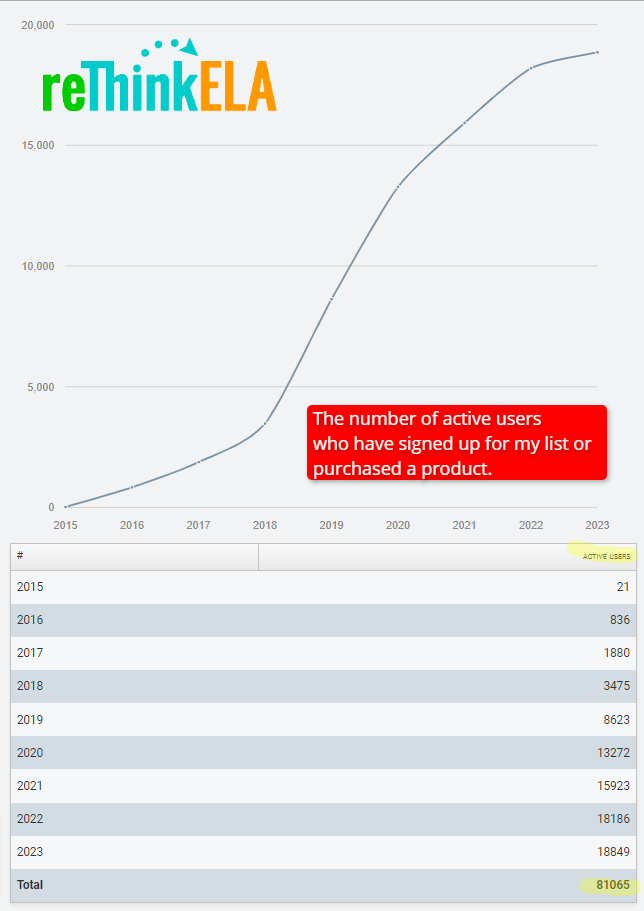How would you like to build a website that gets
more than 2.7 million visitors?
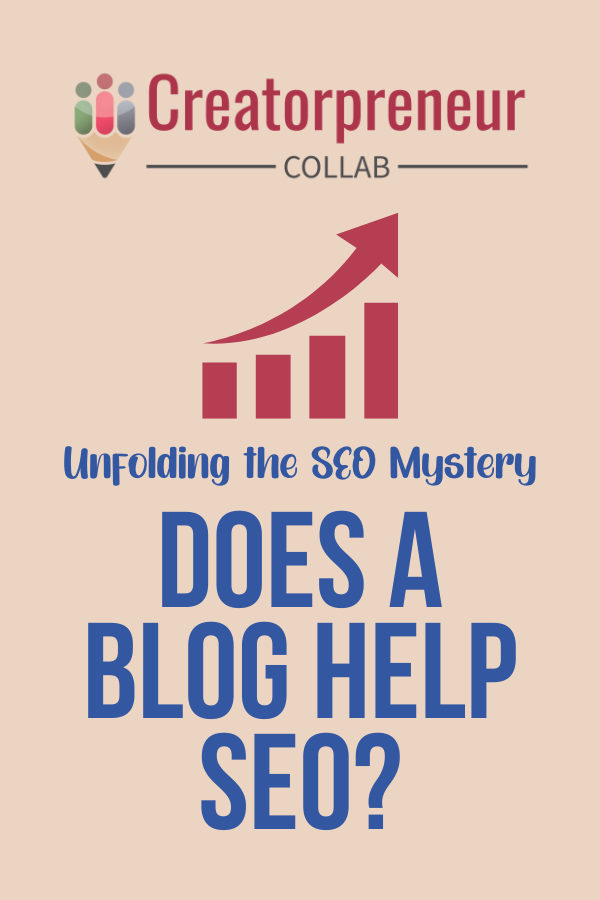
The digital landscape has never been more competitive. In an era where visibility is paramount, and everyone is clamoring for that top spot on the search engine results page (SERP), a pertinent question often pops up - does a blog help SEO? The quick answer is a resounding "Yes," but there's much more to this story than meets the eye. Let's dive right into it!
Before I share my story, I'd like throw a few numbers your way. Giada Nizzoli of Crafty Copy writes:
Google prefers websites with lots of content, and updating your blog regularly will automatically result in tons of new pages. In fact, websites with blogs have a whopping average of 434% more indexed pages than websites without them!
In fact, businesses that blog have significantly better marketing results, including 55% more visitors and 97% more backlinks, as well, according to Rick Burnes of Hubspot.
Let's add a dash of context to this discussion. I'm not just any run-of-the-mill writer; I'm a seasoned business owner with two decades worth of invaluable experience under my belt. In 2001, I started a web design and hosting company, which I sold in 2009 so I could be an English teacher. Then in 2014, I embarked on a mission to start a teacher blog – a place where I could share my teaching story and learn with others. The journey has been nothing short of extraordinary. Since its inception, the blog has welcomed over 2.7 million visitors, testament to the immense value it provides to its audience.

I was just talking about about this with my daughter who told me a story she had not shared before: When she was a senior in high school, she was sitting in English class with the school’s learning management system pulled up on her computer. She saw a tab for staff links and clicked it. On the first page, she immediately saw a link — to my website!
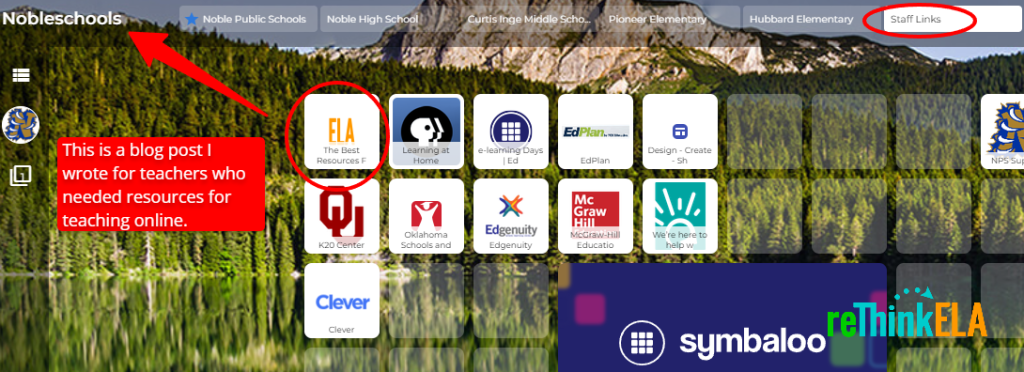
I've also nurtured a vibrant mailing list, boasting over 10,000 subscribers. And while a few members have retired or transitioned out of teaching, they've only made room for fresh, enthusiastic minds to join our thriving community. It's worth noting, too, that the blog has been a consistent revenue generator, adding a robust financial layer to its academic and social impact. So, when we talk about blogging and SEO, you can be sure that I'm speaking from firsthand, deep-dive experience.

The Fundamentals: SEO and Blogging
Before tackling the question, "does a blog help SEO?" it's essential to understand the basics of SEO and blogging.
What is SEO?
Search Engine Optimization, fondly known as SEO, is the practice of enhancing a website's visibility to search engines. This process involves optimizing various elements of your site, from the architecture and layout to the content and backlinks.
This process may involve the following SEO tactics Kim Grant wrote about in 2021:
Understanding Blogging
Blogging is an act of writing posts on a website or a blog, often in an informal, conversational tone. Blogs can range from personal stories to professional insights, educational content, or industry news. The goal is to engage your audience, establish authority, and ultimately, attract more traffic.
Not only can blogs help you generate traffic from search engines, they also serve as a valuable tool for education-based marketing. Your blog enabling your customers to learn more about your products and services, which builds trust. Additionally, as you share your banner messages through your blog and social media, you’ll naturally develop a community of people who know you, like what you’re doing, and trust you enough to partner with you, buy your products or services, and promote you to others.
Even better WordPress-powered blogs can help you effectively manage your content, build customer relationships, and boost sales for your business.
The Intersection of SEO and Blogging
Blogs can play a critical role in SEO. When you craft quality blog posts consistently, you provide search engines with fresh content to index. Not to mention, blogs are a prime place for implementing those crucial keywords to increase your online visibility.
Even better, when you optimize your website for search engines, you end up with a ton of organic traffic. That means you don’t have to pay for advertising to get people to your site where they’ll read your content, download your lead magnets, and buy your products or services.
The Big Question: Does a Blog Help SEO?
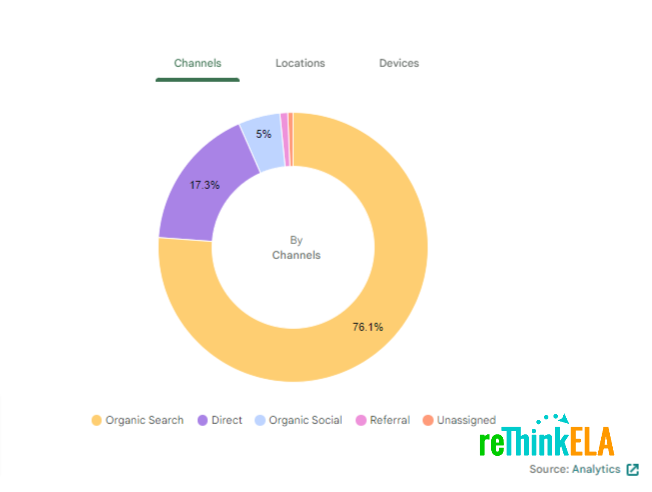
Now that we've got the basics down pat, let's dive deeper into the correlation between blogging and SEO.
Fostering Freshness and Relevance with Blogs
Search engines crave fresh, relevant content — and so do your readers. When you update your blog regularly with high-quality posts, it signals to search engines that your site is active, current, and providing value to visitors. Essentially, a blog can act as your ticket to better SEO. And what is good for human readers is also good for SEO — with some minor tweaks.
Blogs as a Hotspot for Keywords
Keywords are like signposts that guide search engines to your content. Through targeted blog posts, you can effectively use primary, secondary, and long-tail keywords, which can help enhance your visibility on SERPs. In my course, SEO Power Up, I talk about how you can find those long-tail keywords and target the ones that are easier for you to rank for yet have enough traffic to make your time and effort worthwhile.
Boosting Backlink Opportunities with Blogs
High-quality blog posts can attract backlinks from other reputable sites. These backlinks are like endorsements, signaling search engines that your content is valuable and trustworthy. Plus, they can drive referral traffic to your site, contributing to improved SEO.
Not sure how to get reputable backlinks? I share several strategies in SEO Power Up, including:
SEO and Blogging: A Winning Strategy
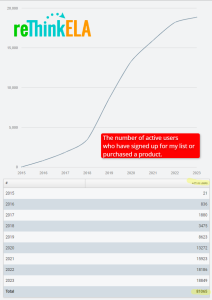
Click to see full-size image.
The benefits of integrating SEO with blogging are manifold. Let's explore some of these advantages in detail.
Driving Organic Traffic
Blogs offer an excellent opportunity to drive organic traffic. By consistently producing SEO-friendly blog posts, you can increase your chances of ranking higher on SERPs, thus attracting more organic visitors.
One of my web hosting and design clients has been working on his SEO for several months (Yes, SEO takes time) and when I ran a recent SEO report on his website, we discovered that he’s ranking number one for at least three keyword phrases with significant traffic. One of those phrases is currently accounting for 37.5 percent of his site’s organic search traffic!
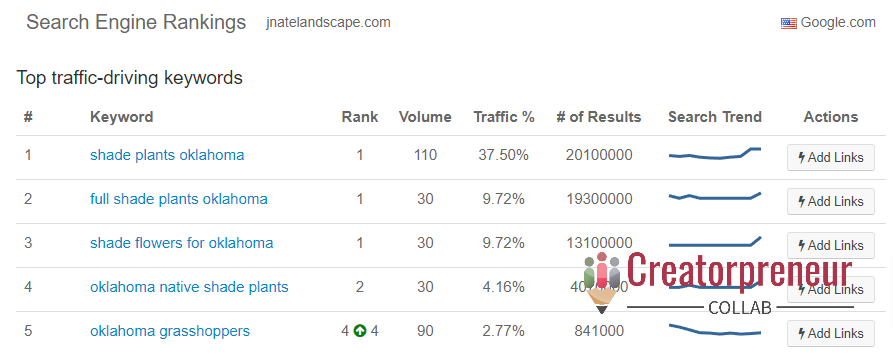
Improving User Engagement
Blogs provide a platform for visitors to engage with your content, increasing dwell time. Engaging, high-quality content can reduce bounce rates and increase page views – two important factors that search engines consider for rankings. Some strategies you might use, once your organic traffic starts flowing, include:
Establishing Authority
High-quality, authoritative blog posts can help build your brand's reputation. Over time, your blog can become a go-to resource in your industry, which can boost your SEO efforts.
Turning the Tables: How to Optimize Your Blog for SEO
Now that you know how a blog helps SEO, the next step is understanding how to optimize your blog posts for maximum SEO benefits. I’m just going to give these a brief overview, as these are the topics I discuss in-depth in my course.
Frequently Asked Questions
Absolutely! A blog provides fresh, relevant content for search engines to index, offers opportunities for keyword implementation, and can attract valuable backlinks.
Unique, high-quality, and valuable content that provides answers to user queries helps SEO. The content should be well-structured and easy to read, with a good use of relevant keywords.
The key is consistency. Whether it's once a week or once a month, maintaining a regular blogging schedule can signal to search engines that your website is active.
Keyword optimization involves researching, analyzing, and selecting the best keywords to drive targeted traffic from search engines to your blog.
Backlinks from reputable websites signal to search engines that your content is credible and authoritative, which can boost your site's SEO.
You can make your blog mobile-friendly by adopting a responsive design, optimizing images for mobile, and ensuring quick load times.
Conclusion: Blogging – An Essential Tool for SEO
So, does a blog help SEO? You bet it does! Regularly updated, quality blogs provide search engines with fresh content to index, while offering a platform for keyword optimization and backlink opportunities. Beyond driving organic traffic, a blog can improve user engagement and establish your brand as an authority in your field. Don't hesitate – it's time to integrate blogging into your SEO strategy!




